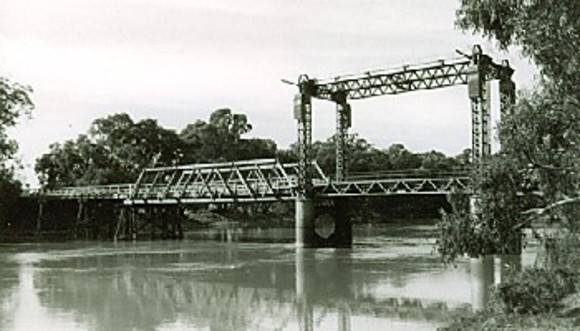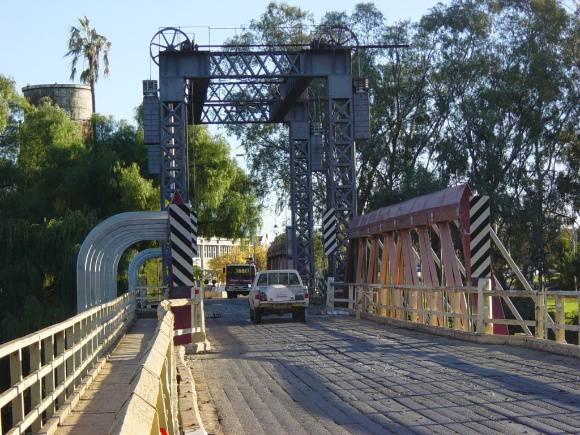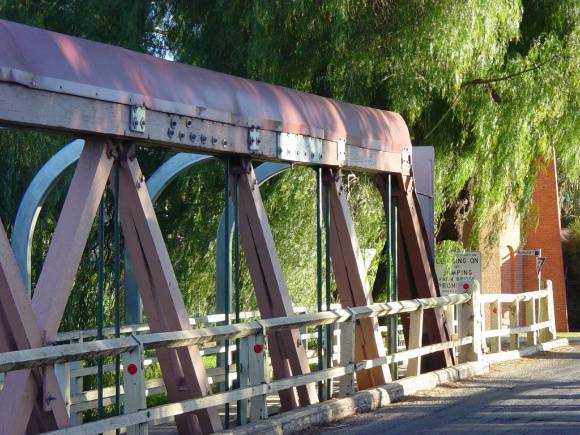| Back to search results » | Back to search page » |
|
Swan Hill Lift Bridge
LocationSwan Hill Road,, SWAN HILL VIC 3585 - Property No B6941
File NumberB6941LevelState |
|
Statement of Significance
The Swan Hill Bridge is historically, scientifically, socially and aesthetically significant at State level. It is composed of a central steel lift span, flanked by large timber through-truss spans and with timber-beam approach spans at either end. When built in 1896 it represented the very latest and most sophisticated Australian design, both in its lift-span technology and its Allan trusses. Designed by the leading Sydney bridge engineer, Percy Allan, it was built by the prolific Victorian bridge-building firm of Farquharson, which constructed numerous well-known large river bridges: Chinaman's Bridge and the old Seymour highway bridge that still span the Goulburn River, a series of Murray River bridges including superb existing lift-span and/or timber-truss bridges at Swan Hill, Tocumwal, Cobram and Howlong, and the now-relocated Darlington Point bascule bridge of 1905. The firm also built numerous other big Victorian and New South Wales river bridges that no longer exist, including the second Union Bridge at Albury and the old Tintaldra truss bridge.
The Swan Hill lift-span and through-truss bridge of 1896 represented an especially important achievement for both Percy Allan and the Farquharsons. This was one of the earliest bridges to be built to Allan's innovative ninety-feet timber-truss design of 1893, which would be replicated all over New South Wales. This was also the first lift-span bridge to be fitted with Percy Allan's improved one-man lifting mechanism, used on virtually all later New South Wales lift-span birdges. No other Murray River bridge was ever built with the ninety-feet versions of the Allan truss found at Swan Hill, and no Allan-truss bridge was ever built south of the Murray River. Only two Australian bridges using Allan trusses adjacent to movable-spans are believed to survive, with the other example (not far distant at Tooleybuc) possessing smaller standard seventy-feet Allan trusses from 1921. The timber-beam approach spans used round-log beams rather than traditional British squared beams, in accordance with the engineering principles then being enunciated by Professor Warren at Sydney University, but Victorian press commentators misinterpreted this up-to-date bridge engineering as unfortunate "penny-pinching" by Sydney authorities.
In social terms, the Swan Hill Bridge long played a very important role in connecting the colonies of New South Wales and Victoria, and until the building of the Barham Bridge in 1904-5 it provided the only Murray River crossing between Echuca and Wentworth. In a pastoral era, it was vital to the numerous drovers who travelled livestock between Queensland and Victorian markets.In an era of large-scale Riverina irrigation settlements, it provided an essential link between the Wakool-Moulamein irrigation areas and Victorian population and commercial centres and railheads. The impressive big Allan trusses and steel lift span have for over a century contributed to Swan Hill's social identiry as a river town.
Aesthetically, Allan truss bridges with their distinct and graceful geometric patterns in timber have long been recongnized as important contributors to the scenic attractions of New South Wales river crossings. This historic example on the largest of Australian rivers at Swan hill, surrounded by river red gums, has a particular visual appeal and is an important tourist attraction.
Classified: 06/07/1998
Group
Transport - Road
Category
Road Bridge






